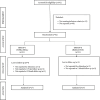Change in serum biomarker levels in patients of apical periodontitis after root canal treatment using two different root canal sealers: A randomized controlled trial
- PMID: 40546861
- PMCID: PMC12178546
- DOI: 10.4103/JCDE.JCDE_213_25
Change in serum biomarker levels in patients of apical periodontitis after root canal treatment using two different root canal sealers: A randomized controlled trial
Abstract
Aim: The aim of the study was to comparatively evaluate the difference in serum pro-inflammatory (soluble cluster of differentiation-14 [sCD14]) and anti-inflammatory (interleukin-10 [IL-10]) biomarkers levels when 2 different root canal sealers are used during root canal treatment (RCT) in systemically healthy patients with apical periodontitis.
Methods: The study was a parallel double-blind randomized clinical trial; 54 carious mature permanent teeth with apical periodontitis were randomized using a block randomization technique to either Group 1 (Tubli-seal) (n = 27) or Group 2 (BioRoot RCS) (n = 27). Participants received root canal treatment (RCT) and were followed up at 15 days and 2 months. Venous blood samples were obtained, and serum pro-inflammatory, sCD14, and anti-inflammatory, IL-10 biomarkers were assessed by ELISA, and Periapical healing was evaluated by periapical index (PAI). Intragroup and intergroup analysis was done using the Friedman and Mann-Whitney U-test, respectively.
Results: In Group 1, pro-inflammatory biomarker (sCD-14) demonstrated statistically significant results (P = 0.008). Regarding anti-inflammatory biomarker (IL-10), neither of the groups displayed statistically significant changes (P > 0.05). An analysis of the PAI scores revealed statistically significant improvements from preoperative to postoperative levels for both groups (P = 0.00).
Conclusion: RCT reduces serum pro-inflammatory biomarker levels and no significant changes in levels of anti-inflammatory biomarkers in patients of apical periodontitis.
Keywords: Apical periodontitis; BioRoot RCS sealer; root canal treatment; serum biomarkers.
Copyright: © 2025 Journal of Conservative Dentistry and Endodontics.
Conflict of interest statement
There are no conflicts of interest.
Figures
Similar articles
-
Systemic antibiotics for symptomatic apical periodontitis and acute apical abscess in adults.Cochrane Database Syst Rev. 2018 Sep 27;9(9):CD010136. doi: 10.1002/14651858.CD010136.pub3. Cochrane Database Syst Rev. 2018. Update in: Cochrane Database Syst Rev. 2024 May 7;5:CD010136. doi: 10.1002/14651858.CD010136.pub4. PMID: 30259968 Free PMC article. Updated.
-
A Comparative Evaluation of Post-operative Pain in Patients Undergoing Root Canal Treatment With Four Different Types of Sealers: A Randomized Controlled Trial.Cureus. 2025 May 25;17(5):e84766. doi: 10.7759/cureus.84766. eCollection 2025 May. Cureus. 2025. PMID: 40557029 Free PMC article.
-
Effectiveness of revitalization in treating apical periodontitis: A systematic review and meta-analysis.Int Endod J. 2023 Oct;56 Suppl 3:510-532. doi: 10.1111/iej.13778. Epub 2022 May 31. Int Endod J. 2023. PMID: 35579093
-
Postoperative Pain and Periapical Healing after Endodontic Treatment Using Pachymic Acid-Modified Epoxy Resin Root Canal Sealer: A Double-Blind Randomized Controlled Trial.J Endod. 2025 Jul;51(7):828-835. doi: 10.1016/j.joen.2025.04.002. Epub 2025 Apr 11. J Endod. 2025. PMID: 40222481 Clinical Trial.
-
A 4-year follow-up of root canal obturation using a calcium silicate-based sealer and a zinc oxide-eugenol sealer: A randomized clinical trial.Int Endod J. 2025 Feb;58(2):193-208. doi: 10.1111/iej.14167. Epub 2024 Dec 10. Int Endod J. 2025. PMID: 39655615 Free PMC article. Clinical Trial.
References
-
- Cohen H. 12 th ed. Missouri: Elsevier; 2011. Cohen's Pathways of the Pulp; pp. 619–50.
-
- de Brito LC, Teles FR, Teles RP, Totola AH, Vieira LQ, Sobrinho AP. T-lymphocyte and cytokine expression in human inflammatory periapical lesions. J Endod. 2012;38:481–5. - PubMed
-
- Rôças IN, Siqueira JF, Jr, Del Aguila CA, Provenzano JC, Guilherme BP, Gonçalves LS. Polymorphism of the CD14 and TLR4 genes and post-treatment apical periodontitis. J Endod. 2014;40:168–72. - PubMed
LinkOut - more resources
Full Text Sources


